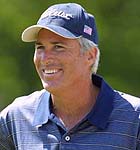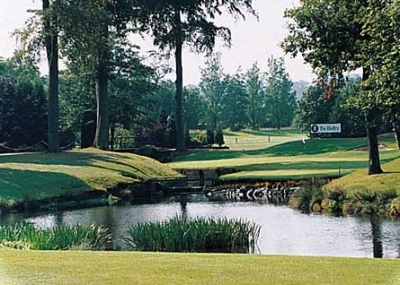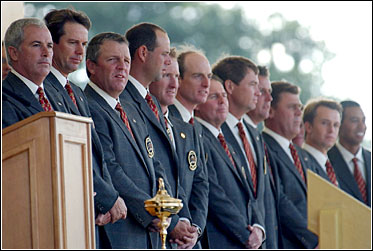By Jeffrey A. Rendall
WILLIAMSBURG, VA -- Looking back at the past three years and change, we've seen a lot of Curtis Strange. Sure, he's been around a lot longer than that -- having won seventeen PGA Tour events, including two United States Open Championships (in '88 and '89) during a three decade-plus career as a professional golfer and college player at Wake Forest. He's also the lead commentator for ABC's golf telecasts, earning high standing as one of the best analysts in the game today.
Through the years, Strange was notorious for gritty competitiveness, and his reputation for wearing emotions on his sleeve stems from dramatic triumphs as well as a few heart-breaking disappointments. It's been that way since his childhood, growing up in the Hampton Roads area of Virginia -- first being tutored in the game by his father, Tom, then mentored by former PGA Champion Chandler Harper upon Tom's passing.
Despite the incredible notoriety of his TV persona and on-course accomplishments, he's perhaps best known for captaining the 2002 United States Ryder Cup Team.
Strange has never hid from a challenge, and certainly taking the reigns of the US team after the controversial 1999 competition (highlighted by a stunning US comeback on the final day of competition, followed by a wild celebration that infuriated the European team), the tragic death of Payne Stewart and the occurrences of September 11, 2001 -- made for some haughty issues to tackle during his tenure as captain.
The US team's failure to retain the Ryder Cup last September did not dampen Strange's enthusiasm for his time he spent as the squad's leader. And he's also not disheartened by some harsh criticism he’s endured in the aftermath of the matches. Strange is moving on -- with his reputation intact, his playing career still active, and his television commentating appearances. He's certainly one of the foremost figures in golf, and to put it mildly -- he'll give it to you straight and honestly.
I had the chance to catch-up with Curtis last month (he's currently rehabilitating from elbow surgery, and will be 'out there' again in March), and he was more than willing to touch on his Ryder Cup experiences, as well as some of the broader issues confronting golf coverage in our made-for-TV world:
Q: Curtis -- you've been recovering from elbow surgery -- and with Tiger's absence from golf for the first part of the 2003 season, that makes two notable figures in golf missing from the game. Any thoughts on that?
Strange: (laughing) Funny, my name doesn't get on the front page like his does! You know I hurt just as bad as Tiger -- probably a lot worse!
Ah, that's fine. It'll probably be about March before I can really play competitively.
Q: Well, that'll provide you an opportunity to reflect on the happenings of the past three years. Any general impressions you'd care to share on your time as Captain of the Ryder Cup team?
Strange: The Ryder Cup was the greatest week of my life -- it was everything I dreamed it would be, just watching it and being with the players. Everything came together wonderfully well, and, you know when the players, their wives, the organization... everything was just absolutely perfect to the tiniest detail.
Q: It certainly was fun to watch. But some of the post-Cup coverage wasn't so much fun to read... how fair do you think the coverage was of your role as Captain?
Strange: You know, everybody's entitled to their own opinions, and agree with it or not, that's the way it is. I will always take the high road on that, and there's nothing I can do about it. All I know is, we had a wonderful week, win, lose or draw, and nothing will ever change that in my mind.
And, as the Captain, along with Sarah my wife -- when you work on something for three years, there's certainly more to it than winning or losing. Especially when you get so involved for such a long time -- and in our case (the aftermath of 9/11/01), it became bigger than just a 'win' or 'loss.'
You certainly want to win, because you represent a lot of people back home.
But I've got to tell you -- I draw a lot of strength from the comments and letters I've received. There wasn't one -- and if I'm lying, strike me here -- not one negative comment about what happened over there.
People got it. They knew the matches were played with such etiquette, respect and sportsmanship. And after what happened in Boston (Ryder Cup, 1999), those ends were really a goal of ours. The matches were wonderfully played, and everybody behaved well.
Q: It seems like a lot of the 'commentary' was just trying to stir up a good story.
 |
| Curtis Strange |
Strange: Well, you know going in that you're going to be scrutinized like that, for virtually everything you do. But nobody seems to want to bring up the facts.
I've never made an excuse in my life. If you get beat, you dust yourself off and get back up. You shake the guy's hand, and you come back, ready to play again the next time. And it's the same thing if you win -- you win with humility.
We got beat. The score on Sunday was 28-under (for the Europeans) to 8-under (US team). The facts ruin the stories a lot of times, so the facts never get in there.
Q: A lot of the criticism centered on your order of pairings for the singles matches on Sunday -- but it can hardly be argued that anyone would've beaten Colin Montgomerie that day, and that first match set the tone.
Strange: Oh yeah. Exactly. And for those who've questioned my first three guys, you insult those players. I will defend all twelve of my players to the day I leave this place. You insult David Duvall, David Toms especially and Scott Hoch by saying I didn't have good players up front. They're world-class players.
But when I've been asked questions like that -- I've had to be careful, because anything I say is said to be 'defensive.'
Q: On the lighter side of it, was there anything about the experience that just makes you burst out laughing when you think about your time over there?
Strange: Sure, a lot of things.
One thing was a back-and-forth with a player, who will go nameless. You know, for every match I met 'em on the first tee, wished 'em good luck, doing the whole captain's role.
One of my players, a rookie -- I said, "Just hang in there, now -- they're nervous, just like you are." And he said "I'm not nervous!!!" No, what did he say -- it was "Just let me go!!! I'm okay!!!" I said "Well, I hope you feel better than you look, because you look scared to death." It was funny. He said "Let me go, I'm okay!"
Lots of little moments like that.
Q: What would you say is difficult about being Ryder Cup Captain?
Strange: There're two calls as a captain -- picking your two Captain's choices, and the second is leaving four players out of each match the first two days. It's hard to go to a Hal Sutton, who won his match on Friday, and tell him he's not going to play again until Sunday.
I was really proud of the guys I chose (Scott Verplank and Paul Azinger), and I think they were good selections. All the players were cooperative and supportive.
Sutton was great the whole time. But Azinger's the one who always wanted to play real badly. He sat down too -- he played with Tiger on Friday morning, and sat down 'til Sunday. He wanted to play, and let me know it. I just said, "Hey, you know, whatever."
He's a tremendous competitor. I could've picked any one of three or four guys (speaking of his captain's choices), and Azinger was the 'stretch,' but gosh, at the time, he was playing great and I wanted him on my team. As for his wanting to play, I told him privately "when you're captain, you can do whatever the hell you want to do."
He was funny. During the Ryder Cup week, he was the one who kind of always had an opinion. If you know Paul, he always does, and feels free to share them, too.
Q: The opinions I've heard him talk about, I agree with.
Strange: Me too. I finally set him straight on Saturday night. We were all around the pool table, figuring these Sunday pairings, and the line-ups, and he's doing this and that -- and I looked at him and said, "Let me tell you something, Azinger. When you're captain, you can do whatever the blankety-blank you want to. But I'm the captain now!" (laughs) We all got a good laugh out of it, and that's really what you want to loosen things up a bit.
Q: You seemed to catch a lot of grief from the foreign press about the Tiger practice round incident. What really happened?
 |
| The Belfrey |
Strange: First of all, I want to quash all the rumors right now -- Tiger Woods can't be any better of a team player.
Of all the grief I've gotten, the stuff on him is so unfair it's frightening. He's a complete team player, he comes to play... A lot was written when he played at 6:30 in the morning with Calcavecchia, and that was okay'd by me -- I let him go. He didn't demand that either.
Then I started getting questions about Tiger's practice round.
I never played real well in the British Open, so that was my first time in front of a large, English tabloid-type audience. And they're brutal. I swore to myself I wasn't going to lose it after working hard at it for three years, but I wanted to rip that one guy's throat out -- because it was so unfair to Tiger.
He asked me, "Don't you have a moral obligation to the British public to have Tiger Woods play at the allotted practice time?"
And I said, "No." That seemed to piss him off, and then he came back at me pretty hard.
Q: Any other memorable press guffaws you'd care to expose?
Strange: There were some good ones. They ask, over there, stupid questions, just to get you going. And then they'll write their article on your responses.
Q: Looking a bit ahead towards 2004, is there any advice you'd give Hal Sutton on being a Ryder Cup Captain?
Strange: First of all, I'd never offer anything without being asked. I don't think he wants to ask too much, because he wants the team to be his personality. He's been around long enough, and he's been an accomplished player as well as a Ryder Cup player -- he already knows everything that needs to be done.
He's learned from watching his captains on the teams. He'll do fine. He'll ask all the past captains a little something here and there for players and stuff like that. He's been around the block, and he'll do fine.
There's really no advice to give him because -- it's really.... We make more of the captain's position than it really is. Yes, we do a lot of work in the preparation and organization leading up to it, but it's fun. It's an eye-opener, it's informative.
But as far as the matches themselves, you become more of a cheerleader. And your pairings are not all that difficult. You can basically throw up balls, and how they fall is how you put 'em out on the golf course. It's more than that, but not a whole lot more. You eventually try to match personalities and games, but these are all great players, so it's hard to make a truly bad choice.
Q: Speaking of bad choices, do you think it's a goal of some golf commentators to try and make certain players look bad -- in other words, does it make for a good story? Phil Mickelson has been picked on pretty heavily at times, and from a viewer's standpoint, it's seemed somewhat cruel.
Strange: From a commentator's perspective, absolutely not. From an announcer's perspective, absolutely not. From a producer's standpoint, it makes for a good story. You have to remember, just about all the commentators are/were players. And they have done this, and they understand that what Phil Mickelson is going through is so full of mixed emotions.
Right now, he's the third best player in the world, but hasn't won a major. He can say, 'I've done a lot of wonderful things on the golf course. But, I haven't won a major.' That makes for a good story from a producer's chair.
See, I fight this. When we do a telecast, and all of a sudden I feel like we're starting to beat somebody up a little bit for mistakes, like a Phil Mickelson -- and we go back over the year and show all the questionable shots he's hit -- that's not right. So from an announcer's standpoint, it's never an issue. But from a producer/director, it is, because they've never really been there.
Q: The incident that sticks out in my mind was the one last year at Bay Hill, when he was trying to make up some ground on Sunday, and put his risky second shot on a par five in the water. Then they asked him about it. He wouldn't admit it wasn't the best choice.
Strange: I wouldn't have either. He's not going to allow himself to admit that the shot might have been questionable. But you know what, as an announcer, I can give you the different options that he has -- and you might somewhat question his choice, but you do it in a nice way -- that perhaps the option he took wasn't the 'high percentage option.'
And you present all the options -- if you have time. That's the toughest part of my job, finding time to do that. But when you do have time, you give the option that he's tried, and include things like where he stands in the tournament. He's certainly thinking about all these things, but... the world can see that he just played a dumb shot (laughs), I don't have to say "it was a dumb shot." I can say it in a nice way, "Well, maybe it's not the shot I would've tried," or something. You can get it across.
 |
| USA Ryder Team |
But to question his ability to hit the shot he just hit, is not right. It's not right to question someone who is better than I ever was. Who am I to question Phil Mickelson?
Q: It sounds like it can get hot in the booth real quick on occasions like that.
Strange: I know I'm speaking to the viewer, but I can question his decision in a proper way. I can question the option he took... but does he have the talent to pull it off? Yes.
It's a fine line there, and I think I do a decent job because I try to remember how it was when I had those types of situations. I'm not that far removed from playing, and I still play enough. And it's not like I need to go through the locker room and be liked by these guys.
I think you can say the same thing two different ways -- the right way and the wrong way. And, there're some other guys out there that seem to step on some toes once in a while. And if the public likes that, well...
Q: Can you touch on your experiences while calling the 1999 British Open at Carnoustie, when Jean Van de Velde blew a three shot lead on the 72nd hole?
Strange: That was one case where I really had to say it -- "this is the dumbest thing I have ever seen in my life" -- in order to keep credibility. When everybody in the world is thinking the same thing, I had to say it.
I took a little bit of heat for saying that. But I said to those guys, "Hey, I was just saying what everybody was thinking."
I was actually rooting for him after awhile in that tournament, because it was apparent that he was going to win -- obviously when Tiger fell out, and Justin fell out. It would've been a helluva story for French golf.
He made a lot of friends by handling it in such a classy way, but it was still terrible to watch.
Q: What do you think of the concept of the 'Major Champions Tour?'
Curtis: I didn't agree with it at all, for a couple reasons. One is, the regular tour needs some of the older guys, nearer to the age of 50 for name recognition -- you know, 'star power.'
I also didn't like it for a reason that many people don't think about -- we need the veteran players to be in the locker room to teach the young players. When I first came on tour, I loved hanging around the older guys -- I searched 'em out. If they hadn't been there, I never would've learned some important things.
I'm talking about, from etiquette, as far as taking your hat off when you're walking to the locker room, or whatever it might be -- golf, anything.
You learn from guys who've been around for 30 years.
Plus, who said, that just because you go from age 45-50 -- and you're in that gray area and you're not competitive on the regular tour -- what's wrong with that? That's what happens when you get older. Thank God for the Senior Tour.
I think you can compete at this age, but you've got to get your butt off the couch and go practice more. And stay in some kind of shape. For those who've done that -- they've done well. Nick Price, Raymond Floyd, Hale Irwin...There's a long list of 'em.
Q: Obviously, with the game being dominated by a host of younger players, are there some other changes going on, in terms of security and rowdy crowd behavior?
Strange: Security is the way of the world now. And a lot of questions to me at the Ryder Cup were -- 'why do y'all demand so much security?' First of all, we're not demanding it -- this is the way of the world now. It's at every big sporting event in the world now.
But it was also very well done there. And by and large, it's done very well every week on our tour. We have an ex-FBI guy out there now as head of security -- because of Tiger and a lot of the stuff that's gone on. He's a wonderful person.
 |
There's also the larger issue of spectator behavior -- it's an issue we really have to start policing better than we do. Take that incident last year in Chicago, where that 'fan' heckled Davis Love III. We (ABC) did that event. You know what, I let that guy have it -- that's my job. I'll let the Tour have it, and I'll let this guy have it, because damn-it, that shouldn't be allowed. And even if it does happen, his ass should be thrown out immediately, which that guy was. And we said so, too.
It's safe to say, if you're in need of someone to state the truth (bluntly or otherwise), Curtis Strange is a good person to look to. Just as he laid it out last year at the Western Open in Chicago and at the Ryder Cup matches in England, he'll do the same whenever the situation calls for it.
And, as golf fans, we benefit from it. We thank him for that.
Details:
Please see Part II of this Golf the Mid Atlantic interview, Strange on Golf. And for more information on Curtis Strange, I suggest you access the PGA Tour's website: www.pgatour.com. There's also an excellent chapter on Strange in Jim Ducibella's Par Excellence: A Celebration of Virginia Golf.
| Related Links | Comments on this article? | |
|
Maryland National Golf Club Hollow Creek Golf Club Rocky Gap Resort PB Dye Golf Club in Ijamsville Whiskey Creek Golf Club |
E-mail Jeff Rendall, Editor: jrendall@golftheunitedstates.com |











